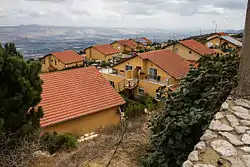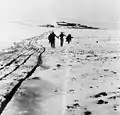Misgav Am
Misgav Am (Hebrew: מִשְׂגַּב עָם, lit. Fortress of the People) is a kibbutz in the Upper Galilee in northern Israel. Located close to the border with Lebanon near the town of Kiryat Shmona, it falls under the jurisdiction of Upper Galilee Regional Council. In 2019 it had a population of 339.[1]
Misgav Am
משגב עם | |
|---|---|
 | |
 Misgav Am | |
| Coordinates: 33°14′52″N 35°32′54″E | |
| Country | Israel |
| District | Northern |
| Council | Upper Galilee |
| Affiliation | Kibbutz Movement |
| Founded | 2 November 1945 |
| Founded by | Former Palmach members |
| Population (2019)[1] | 339 |
| Website | www.misgav-am.com |
Misgav Am is 840 m (2,760 feet) above sea level and overlooks on one side the Hula Valley and on the other side the neighboring Lebanese village of Adaisseh.
History
The kibbutz was founded on 2 November 1945, the anniversary of the Balfour Declaration, by young Palmach members.[2] It was located on the northern part of the depopulated Palestinian village of Hunin.[3]
New immigrants from Europe, the United States and South America began to settle there in the late 1970s.[2]
_-_%D7%A7%D7%91%D7%95%D7%A6%D7%AA_%D7%A0%D7%95%D7%A2%D7%A8_%D7%9E%D7%99%D7%95%D7%9F%252C_%D7%A9%D7%A0%D7%9E%D7%A6%D7%90%D7%AA_%D7%91%D7%AA%D7%9C_%D7%97%D7%99_%D7%A2%D7%95%D7%9C%D7%94_%D7%9C%D7%9E%D7%A9%D7%92%D7%91_%D7%A2%D7%9D-JNF027310.jpeg.webp) Misgav Am first residents 1945
Misgav Am first residents 1945 Kibbutz Misgave-Am. c. 1948
Kibbutz Misgave-Am. c. 1948 Yiftach Brigade carrying out construction work at Misgav Am. 1948
Yiftach Brigade carrying out construction work at Misgav Am. 1948 Mishgav Am. Winter 1948
Mishgav Am. Winter 1948 Misgav Am. Laundry. 1948
Misgav Am. Laundry. 1948 Misgav Am. Repairing dining hall roof after damaged in storm. 1948
Misgav Am. Repairing dining hall roof after damaged in storm. 1948
On 7 April 1980, five terrorists from the Iraqi-backed Arab Liberation Front penetrated Misgav Am in the night and entered the nursery. They killed the kibbutz secretary and an infant boy and held the rest of the children hostage, demanding the release of about 50 terrorists held in Israeli prisons. The first raid of an IDF infantry unit was unsuccessful, but a second attempt, a few hours later, succeeded, and all the terrorists were killed. Two kibbutz members and one soldier were killed, four children and 11 soldiers were wounded.[4]
Immediately after the attack, Israeli troops entered southern Lebanon to wipe out terrorist nests and to intensify the pressure on the Palestinian terrorists in Lebanon. Israel withdrew after five days, because of heavy political pressure by the United States. In the years of Israeli presence in southern Lebanon (1982–2000), the kibbutz had cordial relations with the people on the other side of the border, despite the state of war between Lebanon and Israel since 1948.[5]
During the Second Lebanon war in 2006, several thousands of IDF troops were deployed around Misgav Am, which brought heavy logistical problems regarding food, water and sanitary facilities.
Education
The kibbutz offers an education system beginning age three and ending after high school. There is a daycare center for babies, another for infants and also a kindergarten. Elementary school is at kibbutz Kfar Giladi. Junior and senior high school is located at kibbutz Dafna.
With the new policy of a longer schooling day, children receive various enrichment classes in the region: dance and music at Kfar Blum, ice-skating at Canada centre of Metula, and karate at Ramot Naftali.
Kibbutz life
Around 90 of the 300 people living in Misgav Am are members. Many residents study in the nearby Academic College of Tel Hai. The kibbutz celebrates some of the Jewish holidays together and are a kind of kibbutz tradition: Lag Ba'omer, Yom Ha'atzmaut, Hanukkah, Tu Bishvat and Shavuot.
The kibbutz has a covered swimming pool, a library, a mini-market and sports courts. Besides a 24-hour Magen David Adom emergency station, there is also a health clinic which belongs to Clalit Health Services (Kupat Holim Clalit).
Economy
The kibbutz factory, Sion Texo Medic Ltd., produces bandages and wound dressings.
References
- "Population in the Localities 2019" (XLS). Israel Central Bureau of Statistics. Retrieved 16 August 2020.
- About Misgav Am Misgav Am
- Khalidi, W. (1992). All That Remains: The Palestinian Villages Occupied and Depopulated by Israel in 1948. Washington D.C.: Institute for Palestine Studies. p. 455. ISBN 0-88728-224-5.
- Israel American Jewish Yearbook, 1982
- Radin, Charles A.; Frankel, Rafael (24 July 2006). "Remote kibbutz sees return of bad times". The Boston Globe. Retrieved 29 April 2019.
